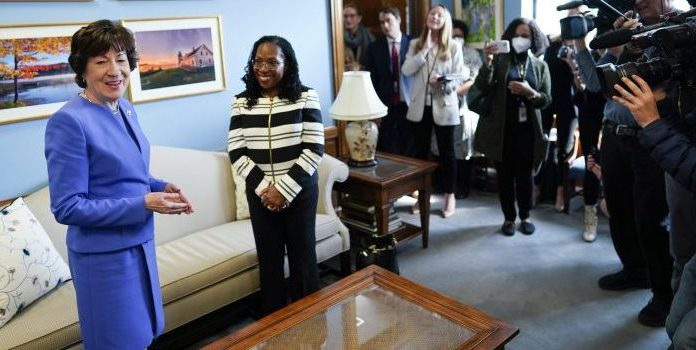(Headline USA) RINO Sen. Susan Collins, R-Maine, had words of praise for Supreme Court nominee Ketanji Brown Jackson after meeting with her for more than an hour and a half at the Capitol on Tuesday, raising Democrats’ hopes that she could be a GOP vote in favor of her confirmation.
Despite a breaking scandal surrounding Jackson’s apparent support for an anti-Semitic speaker while a student at Harvard University, Biden’s affirmative-action nominee was unlikely to face serious resistance in her confirmation effort.
With the stakes low as she would replace a fellow liberal on a majority-conservative court, GOP senators are likely to use Jackson’s confirmation as an opportunity to build political capital and strike a contrast with petty Democrat colleagues who insisted on fighting divisive, partisan battles with each of former President Donald Trump’s nominees.
Collins, a moderate from Maine, said afterward that her discussion with the judge was productive and that her credentials are impressive.
She said that Jackson, an appeals court judge who would be the first black woman on the high court, “explained in great depth” the process she uses when making decisions.
“She takes a very thorough, careful approach in applying the law to the facts of the case, and that is what I want to see in a judge,” Collins said.
Another of the emerging criticisms about Jackson, however, was that her activist philosophy often disregarded the standing legal precedents, resulting in many of her lower-court rulings having been tossed out on appeal.
Collins said she would wait to make a final decision on whether to support Jackson after her confirmation hearings, which begin March 21.
The Maine senator and frequent swing vote is perhaps Democrats’ best hope of landing a Republican backer for Jackson’s nomination.
President Joe Biden and Judiciary Committee Chairman Dick Durbin, D-Ill., who is guiding the vetting process for Jackson, have both claimed they want to get back to the days when Supreme Court confirmations were overwhelmingly bipartisan.
But such statements would appear to be disingenuous given the history both have of waging partisan attacks on GOP nominees and conservative justices. For example, both Durbin and Biden have used the recent threat court-packing as a way to coerce the court into issuing more leftist-friendly rulings.
Biden, moreover, was directly responsible for overseeing the smear campaign against Justice Clarence Thomas roughly 30 years ago, one of the earlier instances in which Democrats overtly politicized the process.
Durbin was complicit in the attacks on Trump’s nominees, most notably Justice Brett Kavanaugh.
By contrast, retiring Justice Stephen Breyer, whom Jackson would replace, was confirmed with 87 votes—including 33 Republicans—in 1994 under then-President Bill Clinton.
With no Democrat votes to spare, both Biden and Durbin have made Collins’s vote, in particular, a priority. Durbin said he called her within hours of learning that Breyer would retire; Biden has called her personally three times, according to her office. She said after the meeting with Jackson that she has “confidence” in Durbin’s ability to lead the hearings.
Collins has only voted against one Supreme Court nominee since was elected in 1996—Justice Amy Coney Barrett, whom Trump nominated after Justice Ruth Bader Ginsburg’s death in September 2020.
Collins claimed she voted against Barrett because of the accelerated six-week timeline that saw her confirmed just days before the presidential election.
While Democrats are using the rapid timeline for Barrett as a model for Jackson, Collins says the circumstances are different. For one, although it is an election year, the vacancy is not being filled immediately before an election. (Collins herself was up for re-election just weeks after Barrett’s 2020 confirmation.)
She has also noted that Jackson has been confirmed by the Senate several times before, for two federal judge positions and for the U.S. Sentencing Commission, where she served under former President Barack Obama.
Collins, Lisa Murkowski of Alaska and Lindsey Graham of South Carolina were the only three Republican senators to vote to confirm Jackson to the appeals court last year.
Murkowski said in a statement last week that her previous vote did not mean she would be supportive this time, and Graham has signaled he won’t vote for Jackson after he pushed Biden to pick a different candidate from his home state, federal Judge J. Michelle Childs.
Other Republicans are unlikely to vote for Jackson. Senate Republican Leader Mitch McConnell, who met with the nominee last week, afterward questioned her support from left-wing advocacy groups.
“She’s clearly a sharp lawyer with an impressive resume, but when it comes to the Supreme Court, a core qualification is judicial philosophy,” McConnell said.
Jackson is meeting with senators one-on-one this week, a ritual for nominees, as the Judiciary committee prepares for hearings and as the White House makes the case for her confirmation.
On Tuesday, Jackson also met with Democratic Sens. Mazie Hirono of Hawaii, Richard Blumenthal of Connecticut, Sheldon Whitehouse of Rhode Island and Cory Booker of New Jersey. She also met with Republican Sens. Rick Scott of Florida and Ted Cruz of Texas. All but Scott sit on the Judiciary panel.
Adapted from reporting by the Associated Press

